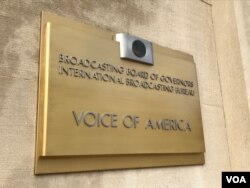Russia said Thursday it has warned nine United States government-funded news operations they will probably be designated “foreign agents” under new legislation in retaliation to a U.S. demand that Kremlin-supported television station RT register as such in the United States.
The Russian Justice Ministry said Thursday it had notified the Voice of America (VOA), Radio Free Europe/Radio Liberty (RFE/RL) and seven separate regional outlets active in Russia they could be affected.
The ministry published a list of the outlets on its website, including a statement that said the changes were likely to become law “in the near future.”
Expands 2012 law
Russia's lower house of parliament approved amendments Wednesday to expand a 2012 law that targets non-governmental organizations to include foreign media. A declaration as a foreign agent would require foreign media to regularly disclose their objectives, full details of finances, funding sources and staffing.
Media outlets also may be required to disclose on their social platforms and internet sites visible in Russia that they are “foreign agents.” The amendments also would allow the extrajudicial blocking of websites the Kremlin considers undesirable.
“We can’t say at this time what effect this will have on our news gathering operations within Russia,” said VOA Director Amanda Bennett. “All we can say is that Voice of America is, by law, an independent, unbiased, fact-based newsorganization, and we remain committed to those principles.”
RFE/RL President Tom Kent said until the legislation becomes law, “we do not know how the Ministry of Justice will use this law in the context of our work.”
No access to cable in Russia
Kent said unlike Sputnik and other Russian media operating in the U.S., U.S. media outlets operating in Russia do not have access to cable television and radio frequencies.
“Russian media in the U.S. are distributing their programs on American cable television. Sputnik has its own radio frequency in Washington. This means that even at the moment there is no equality,” he said.
The speaker of Russia's lower house, the Duma, said Tuesday that foreign-funded media outlets that refused to register as foreign agents under the proposed legislation would be prohibited from operating in the country.
However, since the law's language is so broad, it potentially could be used to target any foreign media group, especially if it is in conflict with the Kremlin.
"We are watching carefully ... to see whether it is passed and how it is implemented," said Maria Olson, a spokesperson at the U.S. Embassy in Moscow.
WATCH: US Ambassador to Russia Jon Huntsman Jr.
The amendments, which Amnesty International said would inflict a “serious blow” to media freedom in Russia if they become law, were approved in response to a U.S. accusation that RT executed a Russian-mandated influence campaign on U.S. citizens during the 2016 presidential election, a charge the television channel denies.
Putin has last word
The amendments must next be approved by the Russian Senate and then signed into law by President Vladimir Putin.
RT, which is funded by the Kremlin to provide Russia’s perspective on global issues, confirmed Monday it met the Justice Department’s deadline by registering as a foreign agent in the U.S.
The United States considers RT a propaganda arm of Russia, and told it to register its foreign operation under the Foreign Agents Registration Act aimed at attorneys and lobbyists representing political interests.








